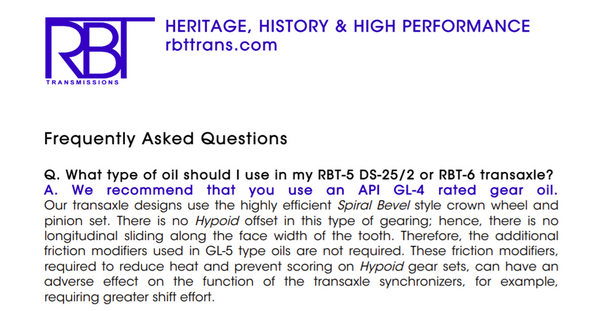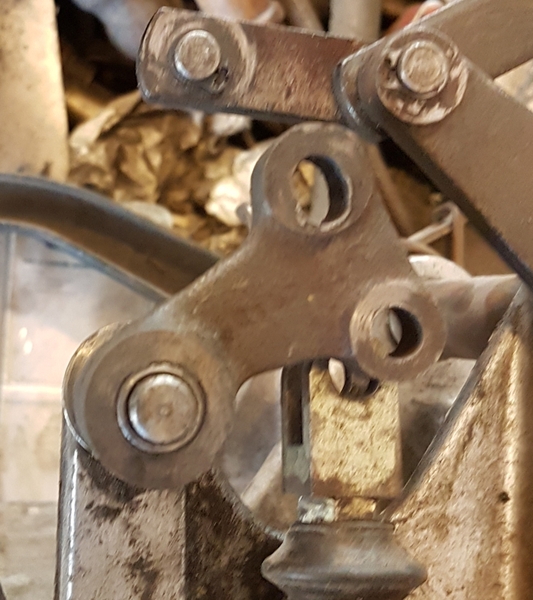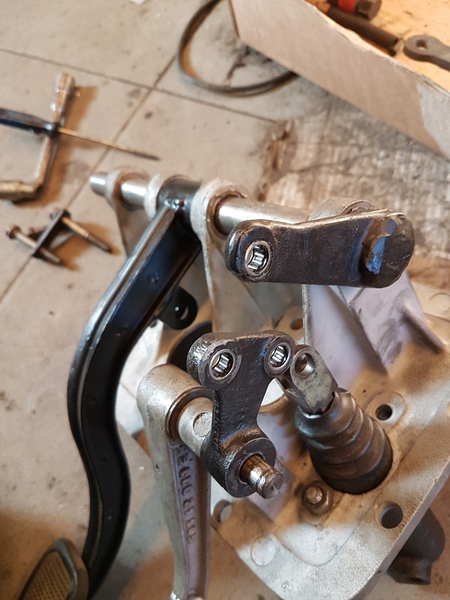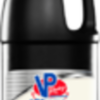I recently replaced the clutch and pressure plate (from PI Motorsports) and have done my best to adjust everything according to the various posts and readjusted over and over. It just seems like the clutch doesn't disengage far enough, even with the pedal to the floor. Maybe I need a long throw slave cylinder? Iam running "Redline Full Synthetic Lightweight / Shockproof" gear oil but still need to shift somewhat slowly or I get some slight gear interference (just slight, nothing major). It's drivable, but I worry about wear on the syncros over time. Maybe I am just not accustomed to the Pantera ZF gated shifting idiosyncrasies. Does anyone think the issue could be related to the gear oil I used? Any other ideas?
Replies sorted oldest to newest
The Redline gear oil that’s the closest to matching the factory recommendation is MT-90. That being said, your problem sounds more like insufficient clutch release when changing gears. You can measure the clutch release with a feeler gauge, through the inspection hole in the bellhousing. I don’t recall the appropriate measurement but it’s here in the forums, most likely posted by Bosswrench.
Some of the problem is the mechanical part of the clutch release linkage. ALL of it is unhardened-steel-on-unhardened-steel, never lubricated and each little wear clearance is additive. The L model over-center linkage under the dash is particularly susceptible because there are so many steel on steel pieces. After 50 years of this, the clutch disc simply doesn't get enough motion to fully release.
I use a constant-contact throwout bearing that need NO free play at the release lever, which helps. A long throw slave might help, but go thru your linkage and see if there's anything grossly worn. Take that part off and weld up the worn area & redrill. Or add a bronze bushing (or four)..
NO syntectic oil, as above 80/90 or just 90 Limited slip mineral..all it is easy ..just change ever "year" that is more improatant as the 5 synchs and the slimited slip clutch disk do corrode..
Mat
Thanks for all the great suggestions. I will blead the system again, check for wear on the metal-to-metal parts, double check all the adjustments, replace the synthetic oil with a non-synthetic 80W-90 for limited slip. If that doesn't cure the problem, I will try a long throw slave cylinder. Does anyone know where I can buy a long throw slave cylinder for a Pantera?
There are two types of lube: one is straight 80W90 either synthetic or not- synthetic. The second is the same but with a portion of limited-slip additive, sometimes called "Positraction Additive". This material allows a bit of slip in your limited-slip clutches and prevents jerking from stick/slip/stick in tight turns. Its especially noticeable in rain/snow or on other low-traction surfaces.
If your car has badly worn limited slip clutches (3 per side), your won't notice the jerking. So I prefer lube with the additive; it can't hurt and may help low speed handling. Or, you can add anti-slip yourself to plain lube. GM EOS or other; not expensive & doesn't seem to wear out. Note that the Pantera is 50+ yrs old and some mistreated cars still have the original lube. ZF says to change it regularly. As for a long travel slave, the vendors are your best bet. Some are stainless steel.
Dan, before you do anything else, just change the oil in your ZF. Redline admits, most of their GL-5 gear oils are too slippery to use in a manual transmission. You may be experiencing this with the gear oil you're using. According to Redline, MT-90 (GL-4) is the exception. Its intended use is in manual transmissions and transaxles where a GL-4 gear oil was originally specified. When I switched from petroleum based to MT-90 synthetic gear oil, I immediately noticed shifting was easier. Lloyd Butfoy (RBT) says the only problem he finds with synthetic gear oil is, you're more likely to develop leaks.
If you decide to use petroleum based gear oil, keep in mind, the factory recommended spec. is 80W-90 GL-4. Some GL-5 oils may work fine but this is what ZF (and now RBT) recommends. Regardless of what lube you use, RBT recommends you change it annually, regardless of mileage.
Attachments
@bosswrench posted:Some of the problem is the mechanical part of the clutch release linkage. ALL of it is unhardened-steel-on-unhardened-steel, never lubricated and each little wear clearance is additive. The L model over-center linkage under the dash is particularly susceptible because there are so many steel on steel pieces. After 50 years of this, the clutch disc simply doesn't get enough motion to fully release.
I use a constant-contact throwout bearing that need NO free play at the release lever, which helps. A long throw slave might help, but go thru your linkage and see if there's anything grossly worn. Take that part off and weld up the worn area & redrill. Or add a bronze bushing (or four)..
Here is the state of the speader on mine when I disassembled it
And here it is after fitting the needles sleeves
Attachments
You can search the forum on the choice of ZF oil as it has been discussed numerous times but I will state what Roy Butfoy (Lloyd's father) told me when he rebuilt mine in 1990 - Use Castrol 80W90 GL5 gear oil (NON synthetic) and change it annually. Why do something different than what the master directed. His advice has served me well for 32 years.
After reading RBT's recommendation along with input from others on this thread, it seems like there are not many offerings that are suited for out transaxles. I have zeroed in on one that looks like it is a correct match. It is a mineral oil and is API GL4. It is called:
VP Classic® Hi Performance SAE 80W-90 API GL4 Gear Oil
Here is a link to it:
https://vpracingfuels.com/prod...e-80w-90/?c=261&
Does this look like a good fit?
I've not heard anything bad about Redline in ZFs. But keep in mind that our ZFs do not normally have any yellow metal inside them- usually referring to the sacrificial bronze or brass synchro rings in many American transmissions. ZF uses all-steel synchro rings that last much longer than brass. There were a few brass ZF synchro rings produced or adapted by unknown shops some years ago, but I haven't heard about them in awhile.
Steve,
I don't see any mention of a limited slip additive for the VP Racing oil.
John
Jack,
My experience with Redline was that shifting was slightly easier and my fairly new side and input shaft seals started leaking. I spoke with Lloyd Butfoy and he suggested draining the Redline and refilling with whatever gear oil I had been using before I tried the Redline. Problem (leaks) solved.
John
John, good catch. I suppose the limited slip additive could be added to the VP oil. Which oil are you currently using?
If you want a mineral based 80W-90 GL-4 gear oil, there are a few available, including Driven GO, PennGrade 1 (formerly Brad Penn), Castrol and the VP Classic Steve mentioned. My ZF's have always worked fine without any limited slip additive. Perhaps you should only add it if you find you need it.
Hi Jan,
I have used it before and it seems fine, but have switched to VP Racing Classic GL4.
Lloyd writes the following in his RBT website:
Q. What type of oil should I use in my RBT-5 DS-25/2 or RBT-6 transaxle?
A. We recommend that you use an API GL-4 rated gear oil.
Our transaxle designs use the highly efficient Spiral Bevel style crown wheel and pinion set. There is no Hypoid offset in this type of gearing; hence, there is no longitudinal sliding along the face width of the tooth. Therefore, the additional friction modifiers used in GL-5 type oils are not required. These friction modifiers, required to reduce heat and prevent scoring on Hypoid gear sets, can have an adverse effect on the function of the transaxle synchronizers, for example, requiring greater shift effort.
Attachments
Thanks, I may give that VP Classics a try in my other Panteras now that I see the Valvoline is for non-synchro trans. Here is some addl info on the VP Classic in the link below. I would use Castrol GL4 80-90 but here in the US it's easier to buy crack than that.
Caution on the oils that indicate they are for non-syncro transmissions assumes that the synchronizer rings are made of brass. Some of those GL5 additives are not compatible with brass.
as previously outlined above, that is not the case for our ZF and the caution against a GL5 oil is not applicable to our transaxles.
Larry
Lloyd is recommending GL4 because it makes shifting easier. There is no brass in a ZF or RBT transaxle. VP suggests that their gear oil does not harm brass synchros. We should not buy GL4 based on it being kind to brass and instead that it makes shifting easier as Lloyd describes. He says the hypoid additive works against our synchros. I cannot be judge on this and will yield to the expert.
Here is a list of the currently available gear oils that match RBT's recommendation. This isn't an exhaustive list. I'm sure there are others but these are the ones I know of. There may also be GL-5 gear oils that are OK (eg. Redline 75W-90NS) but because Lloyd Butfoy says to use GL-4 gear oils, that's what I've listed here. Gear oils that say GL-4+ or GL-4/GL-5 are just GL-5 oils. Lloyd also recommends changing your gear oil annually, regardless of mileage driven, due to condensation forming inside the case. In fact, the less you drive your Pantera the more important this is.
Conventional (mineral based):
PennGrade Classic GL-4, 80W-90
Driven Racing Oils, GL-4, 80W-90
Richmond Gear, GL-4, 80W-90
VP Racing Classic, GL-4, 80W-90
Liqui Moly Gear Oil, GL-4, 85W-90
Synthetic:
Redline MT-90, GL-4, 75W-90
Pennzoil Platinum, GL-4, 75W-90
Amsoil, GL-4, 75W-90, Manual Transmission and Transaxle Gear Lube
Motorcraft (Ford) XT-M5-QS, GL-4, 75W-90, Full Synthetic Manual Transmission Fluid
Note: a ZF Transaxle is more likely to develop leaks when using synthetic gear oil. If you're using synthetic oil and you do develop a leak, it doesn't necessarily mean that you have a bad seal or gasket. Synthetic oil is just better at finding a way out than mineral based gear lube! Lloyd Butfoy tells me that even brand new or freshly sealed ZFs sometimes leak when filled with synthetic oil.
Castrol Axle Limited Slip 80W-90 API GL-5 (Former 80W-90 Hypoy C)
Dump that Redline shockproof, I used it in my formula Atlantic Hewland gearbox when I first got it and was destroying gears every outing, since I switched to Lucas oil I have had virtually no issues.
I know beat a dead horse, but I thought I would add these attachments with sources noted in red. Funny the actual Pantera Owners Manual lists GL-5 for the trans, then there is the Pantera Technical Service Bulletins and the Pantera Technical Information. When EP (Extreme Pressure) is mentioned I read elsewhere that GL-5 is a higher EP than GL-4 but maybe both are applicable when the manual states "EP".
Attachments
Keep in mind, our gearbox manufacturer’s recommendation is to use 80W-90 GL-4 mineral based oil. Roy Butfoy always kept a drum of Castrol 80W-90 GL-4 in his shop. They have updated their recommendations to allow 75W-90 GL-4 synthetic. Unfortunately, GL-4 gear oils are becoming increasingly more difficult to find. If you decide to use a GL-5 gear oil, mineral based or synthetic, just make sure it specifically states it’s designed to be used in manual transmissions and transaxles. GL-5 gear oils that are designed specifically to be used in differentials are likely too slippery to allow the ZF’s synchros to work properly.
Steve: Any user feedback on the VP GL-4 gear oil that you started using?
thanks, Lee
Hi Lee,
VP GL-4 Classic is working well. At one point Lloyd at RBT wrote that GL-4 works best with out synchronizer rings. I'm not sure if I can feel better shifting but this gear oil seems to be working correctly. As others have mentioned, it is important to change the transaxle oil annually.
Thanks, Steve
Thanks Steve. Yes, I do an annual change and was thinking of moving to the VP and hence my asking. Lee
Is the annual change based on what is considered a normal amount of driving? I don't put many miles on my car per year. What is it about the oil that drives the annual replacement?
One of the characteristics of the ZF is, condensation tends to form inside the case. The less you drive your Pantera, the greater a problem this becomes. Water, air and steel bearings, gears, etc. don't coexist well together. This is the reason to change gear oil annually. This is also the reason that your brand new, spare ZF, that's been sitting in a crate, untouched for 40 years, is probably junk by now.
In your red Owners Manual, DeTomaso and ZF say to drain & replace the lube at 3000 mile intervals. Many Panteras have gone their whole 50+ existence on the same factory lube! And almost none have ever had the second shift detent re-greased! But removing it works best.
Marlin mentioned it but the Pantera gear-change system actually has TWO separate shift detents. One is buried inside the ZF and the other is part of the shift-stick assembly in the cabin. Having two detents often causes shift problems. Total removal of the cabin detent frees up shifting on any Pantera, and for a change, the job is easy. D. Quella used to do it free on all the cars he worked on.
Take off the chromed gate and the trim piece (4 metric screws). This exposes the top of the shift mechanism. The shift stick is in a die-cast aluminum housing. Behind the shift stick is a 1" OD snap-ring covering a hole in the housing. Remove the snap ring; inside is a spring on top of a vertical sliding piston. Tease the upside down piston out with a strong magnet, a finger or other tool. It will be caked with ancient dried grease. On the bottom of the piston is a small protruding tip: that is the detent which engages the shift rod going back to the ZF. Bag the piston & spring and put on a shelf somewhere for the next owner.
Close up the hole left when the piston was removed (I used a wine-bottle cork-Chianti, of course!) You're done- replace the trim and shift gate and try your new smooth shifting Pantera- all done while sitting comfortably in the drivers seat and without draining & replacing the brand of ZF lube. But the old lube in your ZF still needs replacing at least yearly!
Note- the above fix and the tach repair in another post today on this Site, were both subjects of our Pantera in illustrated print articles to be found in long-past POCA Newsletters. There are now over 600 such tech articles archived.











